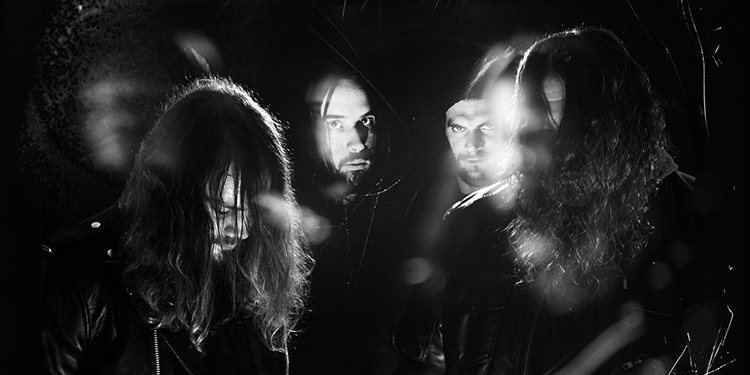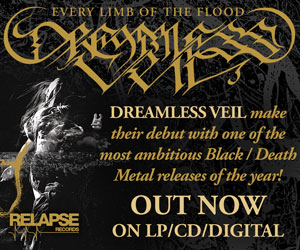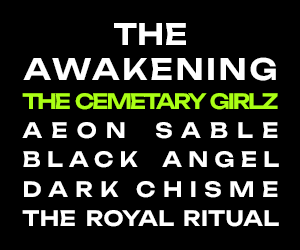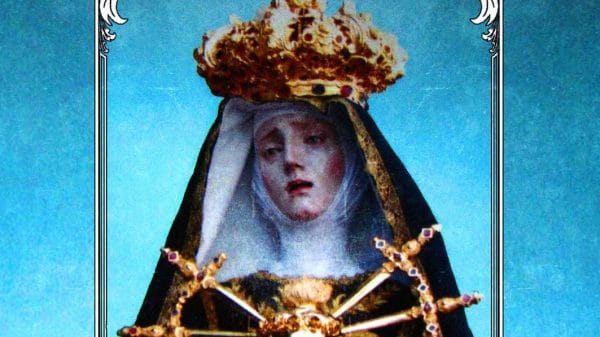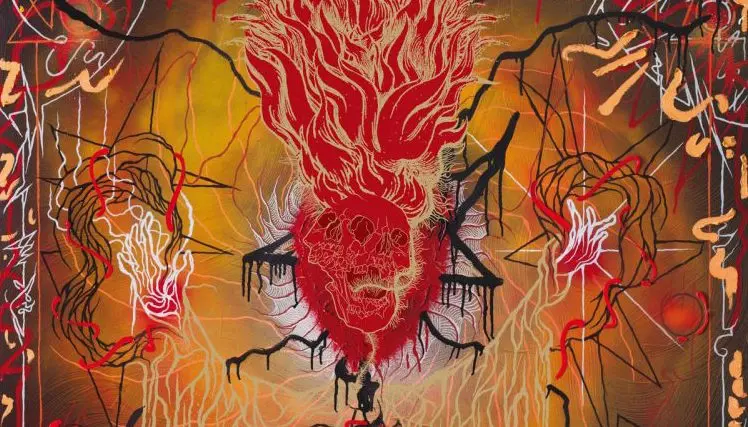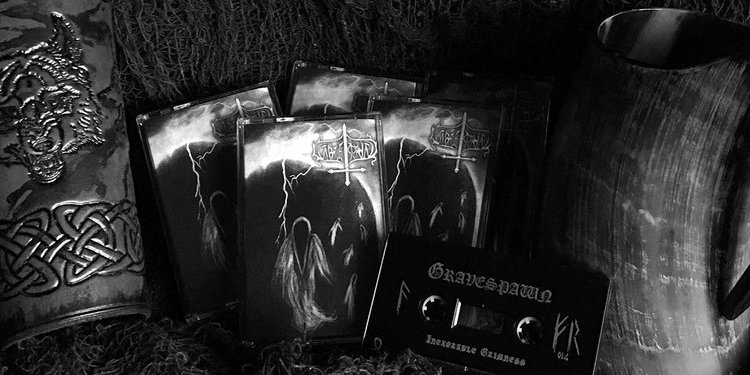What strikes me about Chaos Moon is how you have embraced melody but paint over it with harsher sounds; as opposed to Skáphe, where the music draws the listener’s mind into a never-ending black pit. Can you describe the different creative spaces you go to when writing for Chaos Moon or Skáphe?
The more I think about this question, the more I feel that I don’t get to choose. Meaning, my subconscious swings me in whatever direction it wants. Sometimes I’ll sit down with my guitar with intent to write, lets say, a Chaos Moon track. It will, more often than not, turn into something completely different. I let myself run free, whatever becomes of it gets sorted into its appropriate project.
If someone said you could only have one piece of vinyl, which record would you keep and why?
This is an amazingly difficult question to answer. I don’t think there is one piece of music that could be placed on that sort of pedestal. I think I’d end up hating whatever I had chosen. It would be best to have nothing and learn to deal with that.

Photo by Kevin Moser // H.V . // Kassandra Carmona
Did you face any struggles or creative battles when you were creating Eschaton Mémoire? Would you say this was the most personal record you have ever been a part of?
Eschaton Mémoire was the most difficult album to finish in my years of writing. It wasn’t difficult to write, but retaining the lasting satisfaction or sense that we achieved what we wanted was difficult to capture. The first version of EM was completed in 2014-ish, but was more of a wild assortment of styles and ideas with little cohesion. Guitars, bass, and vocals were committed before I went in and re-wrote several of the riffs, but kept the gist of each song in tact. This second version was completely recorded, mixed, mastered, and submitted to the label for pressing. I was very unhappy with the final product, but attributed it to burn-out.
Steve (Blackburn, the other guitarist) and I started demoing ideas for a proposed split after we submitted V2. It was instantly much better than V2 of the full length, even just as rough unworked demo tracks with a drum machine. I completed the first demo track, which later became Eschaton Memoire II, and decided that V2 wouldn’t do the band any good. Both Steve and I wrote the rest of the album very quickly, we were on the exact same page. I don’t think anyone can tell who wrote what, it’s all very seamless.
This record, like all others, is of equal importance to me. These are bookmarks. I think this particular bookmark is a bit more focused and refined, but mean no more or no less than anything else.

Did Jef Whitehead listen to the music before he manifested such an insanely awesome cover?
I passed the concept off to him during V2 of the album, I never sent him anything else. I believe he did hear the track “Noema,” which is from that scrapped version, on the PDM III compilation Fallen Empire put out, but I can’t remember if that was before or after the artwork was finished. He did an amazing job, I explained what we wanted and he recreated it as if he peered into my mind.
How did you find yourself in collaboration with humans from Iceland?
I took a shot in the dark and sent a message to H.V Lyngdal asking if he’d like to collaborate on something, expecting to hear nothing back. I’m a huge fan of his music – The Feral Wisdom is one of the best post-second wave albums to be released and I have been a huge fan since its release. But, he was interested and we’ve been in regular contact and collaboration since. The scene there, as everyone is aware by now, is pretty incestuous due to its small size and that spilled over into our collaborations.

Photo by Kassandra Carmona
Was there a defining moment, record or live show in your life that made you realize you wanted to create black metal?
Listening to In The Nightside Eclipse for the first time after semi-blind purchasing the album at a music store. I was familiar with some of Emperor’s music, but never immersed myself. I loved Loss and Curse of Reverence and some other tracks from Anthems, but Nightside really captures everything I thought black metal should be. It was everything I was looking for in music, especially in my youth. That drive to create music in that style sparked there and hasn’t left me to this day.
When you think of the scene now compared to when you were younger, do you see a difference?
There’s a huge difference. When I started listening to/creating black metal, there wasn’t social media or YouTube. There wasn’t much genre-blending, everything was more rooted in the styles tradition. But, I was an outsider to all of that. There wasn’t really a scene where I lived at the time (right between Nashville, TN and the Kentucky state line) and I didn’t want to be a part of any of it. I lurked some old magazines, message boards, and websites to find new bands. It seemed so small and far more intense.
It’s far more watered down now, I think. Maybe due to over-exposure or simply just getting older, but finding sincere black metal, or any metal, is becoming more and more difficult. There’s too much, everyone has a platform now, it’s overwhelming. Not to say that people should stop writing music, but the difficulty of finding something that appeals to me has increased significantly. Although, sorting through numerous copy-cats or bands playing up whatever gimmick is cool to find that one obscure band doing something unique can be rewarding.
If you existed in a Utopian world, do you think that you would be able to create such vile music? Or does the fucked up state of this world (outside of the life you have created with family/friends) serve as a source of inspiration?
I don’t know. I’m leaning towards no, though. If civilization had retained some sort of sterile Utopian state, there wouldn’t be a need to… rebel. There would be no struggle. Rock ‘n Roll is rebellion and struggle. Look at the extreme events throughout society and how culture shifts. The atomic bomb and the creation of rock music/culture – it may not seem like a direct connection, but look at how society shifted since then. You remove the darker elements of humanity and you remove a lot of the great art created as a response. ‘Wisdom comes alone through suffering’.

Photo by Kevin Moser // H.V . // Kassandra Carmona
When you perform live, what state of consciousness does your mind travel too?
I despise performing and I think that’s partially why I still do it on occasion. I’ve noticed that I ‘black out’ or shut down. It’s like trying to remember a dream. I can’t recall much except certain images or just understanding that ‘hey, I was on the stage for 45 minutes playing a guitar.’ It’s surreal and dream-like, no matter how many people are there in attendance.
Some metal heads say that racism and misogyny have a place in black metal because it keeps the art form dangerous – what are your thoughts on that?
Using an art form to justify shitty human behavior is truly pathetic. Black metal hasn’t ever been truly ‘dangerous.’ People are dangerous. If black metal didn’t exist, these shitheads would be in some other scene touting, more or less, the same message. Want to keep the music ‘dangerous’? Do something new, don’t piggy back on the culture and ideas of others. Chaos and freedom. Rid yourself of the petty human superiority complex, this universe doesn’t give a fuck about your race or gender. Does this offend your sense of tradition, honor, pride, whatever other illusion you doll yourself up with? Fuck off.
What music or art outside of metal inspires you?
Too much, honestly. I’m influenced by music ranging from jazz fusion to the cheesiest 80s synthpop. I think I listen to more non-metal stuff than I do metal these days. I try to use these influences by drawing from how they came to the conclusion to write in certain ways rather than reworking a bands music to fit with mine. For example, Skáphe is has a heavy psychedelic or even shoegaze influence, but I don’t write psychedelic or shoegaze parts. I’m not even a huge fan of either style aside from a few select bands. I examine the ingredients used to create these styles of music and put it into a more unhinged and corrupted form with as little imitation as possible.
Outside of music, I’m into surrealism or anything obscure. More into ‘feeling’ as a device of progression rather than straightforward dialog. Leaving things open to interpretation, its message isn’t always clear. Recently, I think the latest season of Twin Peaks achieved that successfully, especially with episode 8. It seems like that particular season generated a lot of strong emotion among fans of the series both positive and negative, which is something that I admire. A lesson in abandoning expectations. If something I create pisses someone off, that is a win. Hats off to Lynch for that.

If you had to describe Skáphe songs in terms of emotions, which would they be and why?
Discomfort and everything that can arise from discomfort. Skáphe isn’t a random improvised mess, everything written has intent. Skáphe doesn’t want you to be comfortable in a groove or easily recognized chord progression. It has its moments of clarity, but it will not last. It’s structure is modelled after experiences in altered states of consciousness, all of your intense thoughts and experiences are fleeting and there’s no structure to any of it. You are at the mercy of your subconscious along with the bliss and horror that may arise to the surface. It all makes sense, but you’re responsible for coming to those conclusions. If you don’t see anything there, then it is not for you.
What is the significance behind always using red and black as the color scheme for Skáphe’s artwork?
Simply to capture the fiery elements of the music. No other color scheme, in my eyes, better suites the music.
